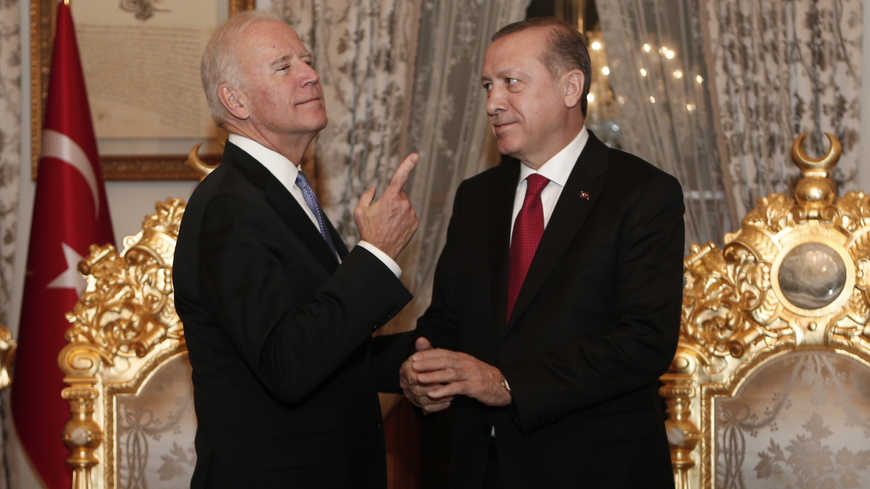Source: Al-Monitor, 21 October 2020, by Andrew Parasiliti
Turkey’s use of Russian S-400 ‘incompatible’ with role as US, NATO ally, says State Department
Turkish President Recep Tayyip Erdogan has a direct line to US President Donald Trump and has gotten adept at using it, knowing he can always go over the head of lower-level US officials issuing warnings or expressing concerns over Turkey’s conduct, such as the Turkish military’s testing of the Russian S-400 missile defense system last week.
This way of doing business could change, however, if Trump’s Democratic rival, former Vice President Joe Biden, is elected president on Nov. 3.
Ankara’s Trump firewall on S-400
Erdogan has counted on Trump as his firewall against those in Congress, the Pentagon and elsewhere who are impatient with Turkey over a range of issues. One of the most sensitive is Turkey’s acquisition of a Russian S-400 anti-aircraft missile system. Turkey is a member of the NATO alliance and Congress didn’t take well to the purchase, imposing sanctions last year, but Trump has so far refused to implement them and shows no signs of doing so. Although the State Department warned of “potentially serious consequences” if Turkey operationalized the S-400, and added that the S-400 is “incompatible with Turkey’s responsibilities as a NATO Ally and strategic partner of the United States,” Erdogan is likely to be unmoved. Absent an ultimatum from Trump, and perhaps even if then, Erdogan is unlikely to back down on the S-400. The Turkish president may be hoarding chits for a give and take on Syria, perhaps, during a second Trump term or, more worrying for Ankara, a less sympatico Biden presidency.
Irreconcilable differences?
The S-400 test last week is yet another sign that Erdogan doesn’t see Turkey’s future solely as a US and NATO ally. How else to rationalize the purchase of a Russian air defense system? This shift has been happening since at least 2011, when differences began to surface with the United States over Syria. The US military was working with Syrian Kurdish military forces that Ankara considers terrorists. In recent years the friction has increased not only over the S-400 purchase, but also with Turkey’s increasingly assertive posture relative to fellow NATO member Greece in the eastern Mediterranean Sea and its backing of Azerbaijan’s ongoing military adventure in Nagorno-Karabakh as well as Erdogan’s frequent verbal swipes at Western powers.
“There is no saving this relationship,” says Steve Cook of the Council on Foreign Relations in our latest On the Middle East podcast. The next administration, whether it be Trump or Biden, will need to accept that US-Turkey ties will be case by case, not governed by notions of alliance commitments.
A non-aligned course
Despite the freefall in US-Turkey ties, it would be a mistake to say Ankara is in the Russian camp. Turkey “will keep its options open” with Russia and Iran, says Cook, as all three share an interest in opposition to a US led-order in the region. But as with the United States, Turkey has its differences with Russia. Erdogan and Russian President Vladimir Putin have sometimes clashing interests in Syria and Libya. Putin is also not amused by Erdogan stirring up Azerbaijan to go to war with Armenia, and even more displeased by the Turkish president hosting his Ukrainian counterpart Volodymyr Zelensky to declare a strategic defense partnership and sign military cooperation deals.
‘Rising star’
The Turkish president is fashioning his own 21st-century non-alignment policy, a unique blend of nationalism, historical grievance, Islamist brotherhood and outsized ambition. Along for the ride or parts of it are Qatar, Azerbaijan, the Libyan government, Northern Cyprus, Malta, Ukraine and the Palestinians. And if there is friction with the United States and Russia at times, so be it.
“All the global and regional balances are rapidly collapsing to leave their places to new ones,” Erdodgan said on Oct. 20. “Turkey, with its strong political and economic structure, is the rising star of the new global and regional quests. Every intelligent and conscientious person accepts that our country, despite some difficulties it is having, is positively distinguishing itself amid crises.”
Our take: Trump, Putin and Erdogan, despite differing interests, operate by personal diplomacy. It’s all “art of the deal” when the three talk, and hard feelings and any baggage are left at the door. Without this type of connection, Turkey’s ties with Russia and the United States could easily spiral downward. Even with a second Trump administration, however, it is hard to imagine US-Turkey relations getting better. So what would change with a Biden administration? Well, Biden has the touch for personal diplomacy, but unlike with other world leaders, there is no chemistry with Erdogan. Biden could probably leverage NATO more effectively, but Erdogan doesn’t mind lashing out at the West; that’s a winner with his political base. Biden is also likely to be more sympathetic to Democratic and Congressional concerns about Turkey, including human rights and sanctions over the S-400.
Andrew Parasiliti is president and chief content officer of Al-Monitor. He previously served as director of RAND’s Center for Global Risk and Security and international marketing manager of RAND’s National Security Research Division; editor of Al-Monitor; executive director of the International Institute for Strategic Studies-US and corresponding director, IISS-Middle East; a principal at the BGR Group; foreign policy advisor to US Senator Chuck Hagel; director of the Middle East Initiative at Harvard University’s John F. Kennedy School of Government; and director of programs at the Middle East Institute. He received his Ph.D. from the Paul H. Nitze School of Advanced International Studies, Johns Hopkins University; an M.A. from the University of Virginia; and a B.A., cum laude, from the University of North Carolina at Greensboro. He is an adjunct political scientist at RAND and a member of both the Council on Foreign Relations and the Virginia Club of New York.
Share the post « Al-Monitor: “The Takeaway: Would US-Turkey ties get better or worse if Biden wins?” by Andrew Parasiliti »

